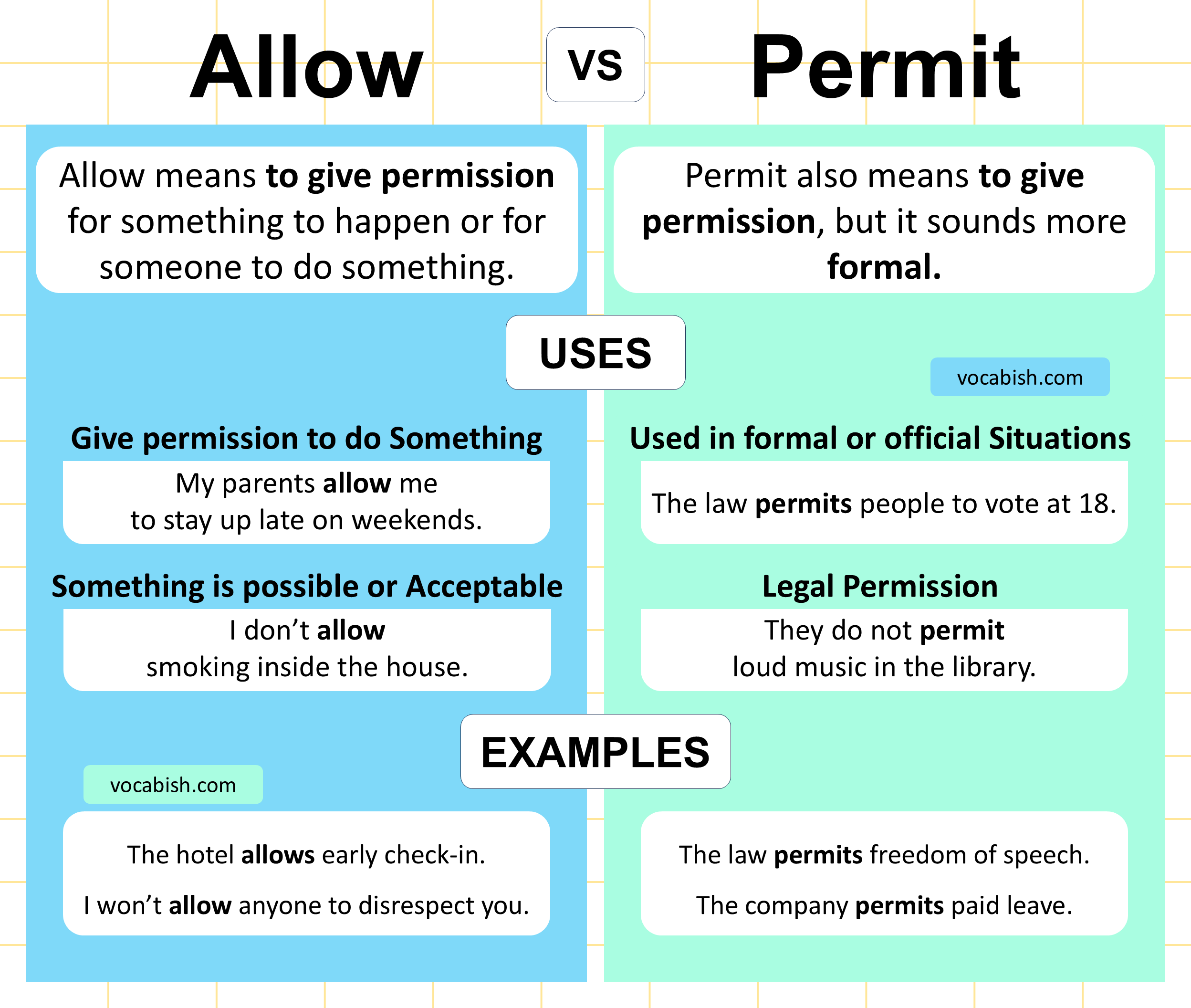Many English learners get confused between Allow and Permit because they have similar meanings but are used in slightly different ways. Understanding the difference is important for correct writing and speaking, and it also helps improve reading and listening skills. In this blog post, you will learn how to use Allow and Permit correctly, with examples that show their meanings and practical uses in everyday English.
You can explore our 100 confusing words list to expand your vocabulary skills!
Meanings of Allow and Permit
Allow
The word allow means to give permission for something to happen or for someone to do something.
It is often used in daily and informal English.
Example: My parents allow me to watch TV after finishing my homework.
Permit
The word permit also means to give permission, but it sounds more formal and is often used in official or written English.
Example: The school does not permit mobile phones during exams.
Differences Between Allow and Permit
| Point | Allow | Permit |
|---|---|---|
| Formality | More informal and common in spoken English | More formal and used in written or official English |
| Usage | Used in daily life situations | Used in laws, rules, and official statements |
| Examples | “My teacher allows me to leave early.” | “The company permits employees to work from home.” |
Usage of Allow
The verb allow is used when you give someone permission to do something. It is also used to show that something is possible or acceptable.
Examples:
- My parents allow me to stay up late on weekends.
- The rules don’t allow students to eat in class.
- The design allows easy access to the battery.
- I don’t allow smoking inside the house.
- They allow visitors to take photos.
Usage of Permit
The verb permit is used in formal or official situations. It is also used when referring to legal permission or written approval.
Examples:
- The law permits people to vote at 18.
- The company permits employees to take annual leave.
- This card permits you to enter the building.
- They do not permit loud music in the library.
- The school permits students to use the computer lab.
Formal and Informal Uses of Allow and Permit
| Type | Allow | Permit |
|---|---|---|
| Formal | The system allows data sharing. | The manager permits staff to work remotely. |
| Informal | My mom allows me to play outside. | My teacher permits late submissions (formal tone). |
Example Sentences with Allow
- My boss allows flexible working hours.
- This app allows you to edit photos easily.
- We don’t allow pets inside the restaurant.
- The hotel allows early check-in.
- I won’t allow anyone to disrespect you.
- They allowed the kids to play in the park.
- Our rules allow three attempts per quiz.
- His health doesn’t allow him to travel far.
- The teacher allowed the students to leave early.
- The device allows users to save data automatically.
- Parents allow their children to choose their clothes.
- She didn’t allow her son to watch that movie.
- The plan allows for some flexibility.
- We don’t allow parking here.
- The school allows visitors only on Fridays.
- I allowed him to explain his side.
- The software allows file sharing.
- Our system allows for instant updates.
- They allowed extra time for the test.
- The teacher allows group discussions.
Example Sentences with Permit
- The museum permits photography without flash.
- The city permits outdoor dining on the sidewalks.
- The rules permit a short break during the exam.
- This visa permits you to stay for six months.
- The school permits only authorised visitors.
- The hospital permits one visitor per patient.
- The system permits access only with a password.
- The new policy permits remote work.
- The law permits freedom of speech.
- The company permits paid leave.
- The regulation permits smoking in designated areas.
- This document permits entry into the event.
- The park permits pets on leashes.
- The manager permits flexible schedules.
- The agreement permits early termination.
- The school permits field trips twice a year.
- The system permits multiple users.
- The university permits part-time study.
- The government permits imports of food items.
- The app permits secure online payments.
Summary on Permit and Allow
- Use Allow in everyday conversation.
- Use Permit in formal, legal, or written contexts.
- Both words mean to give permission, but permit sounds more official.
FAQs on Permit vs Allow
What is the main difference between Allow and Permit?
Allow is more informal and used in daily English, while Permit is more formal and often used in official or legal situations.
Can I use Allow and Permit interchangeably?
In many cases, yes — both mean “to give permission.” However, Permit sounds more official or formal.
Which one is more common in spoken English?
Allow is more common in spoken English, while Permit is mostly used in writing or formal contexts.
What part of speech are Allow and Permit?
Both Allow and Permit are verbs that mean “to give permission.”
Can Permit be used as a noun?
Yes. As a noun, permit means a written permission, e.g., “You need a parking permit.”
Read More

